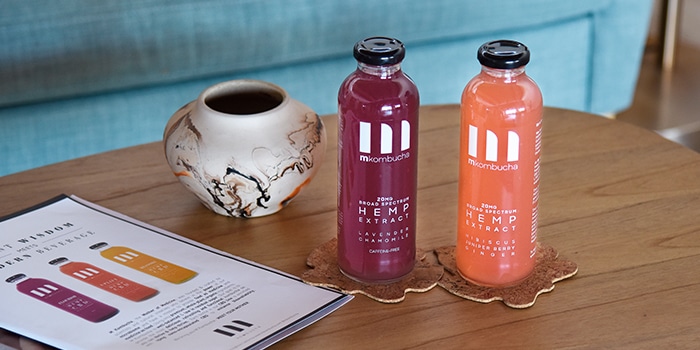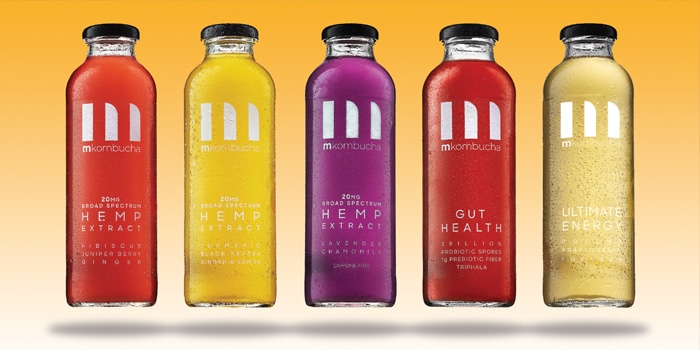Backed by new investment and new innovation, San Diego-based M Kombucha is aiming to take its function-focused brews to a wider audience this year.
While some of the category’s larger players have sought to build a consumer base by leaning into mainstream flavors, M Kombucha, formerly known as Kombucha Culture, is staking its brand on the drink’s purported functional benefits. The product lineup is divided into two sublines: CBD, with three flavors each containing 20 mg of CBD, and the new Functional, which soft launched in January in two varieties, Gut Health and Ultimate Energy. All are sold in 16 oz. glass bottles and in stainless steel kegs.
The roster represents a broad spectrum of ingredients and flavors, from light and floral (lavender, chamomile) to earthy and spicy (ginger, turmeric). Yet the two new flavors represent a further step into functional ingredients: along with yerba mate and guarana for caffeine, Ultimate Energy also contains a blend of adaptogens including ashwagandha, reishi mushroom, schisandra and maca. Meanwhile, Gut Health boasts 3 billion probiotic spores and one gram of prebiotic fiber, along with triphala, a combination of three fruits prepared as a Ayurvedic remedy. Two more flavors are slated to join the Functional line in Q2.
“It’s really important to note the efficacy of the formulations,” said co-founder Adi Ramon. “We developed a Gut Health formulation that is scientifically and clinically backed with the dosage and the combination of ingredients that are in it. That gives us and the consumers the confidence that we are providing true health benefits.”
The addition of Alan Murray, the former CEO of digestive health food and snack maker GoodBelly, to the company’s advisory board underlines M Kombucha’s scientific credentials. Though he admits, despite not being a kombucha fan, to being “blown away by the taste,” Murray also praised Ramon for crafting a brand with “solid science behind it.”
“One thing I’ve been very keen about is that functional food is functional food — you should feel the function,” he said.
M Kombucha’s new strategic investor, Microbiome Labs, also fits into its focus on function: the Florida-based company produces probiotic spores and digestive support-related compounds, including four strains of spores that are used M Kombucha’s Gut Health SKU. According to a statement from the company, the relationship includes “the introduction of M Kombucha’s suite of products into the natural health practitioners channel and the development of a novel new kombucha based product.”
The size of the investment was not disclosed, but the funds have already helped M Kombucha graduate from the Carlsbad, Calif. production facility where it has been operating since launching in 2016. The new facility, just a few miles down the road in Vista, Calif., gives the brand ample runway for future growth, with triple the real estate and 10 times the output capacity of its predecessor. The funds will also be used to add new brewing equipment, hire staff and support marketing efforts as the brand seeks to add to its 200-plus points of distribution.
“With the launch of the functional line, we can expand beyond the retailers that are more receptive to hemp and CBD and into those retailers and distributors that wanted to have the brand but couldn’t carry it because they were not on board with carrying CBD,” she said.
Though its keg service is limited to Southern California, the shutdown of on-premise foodservice in response to COVID-19 has at least temporarily slowed a portion of M Kombucha’s business. Yet Ramon said the slowdown has also provided some valuable time for the brand to be “more strategic” in its approach: along with bringing in a publicist to hone its messaging and communications, the company has introduced courier home delivery in San Diego and shipping throughout California.
Having the ability to get product to customers during the ongoing crisis has helped keep exposure high for the new functional SKUs, Ramon said.
“We can adjust (production) according to sales and what is happening in the market,” she said. “We are deciding how we scale based on product velocity.”

